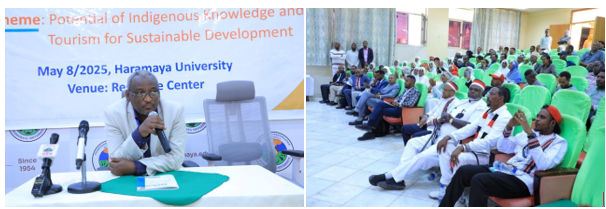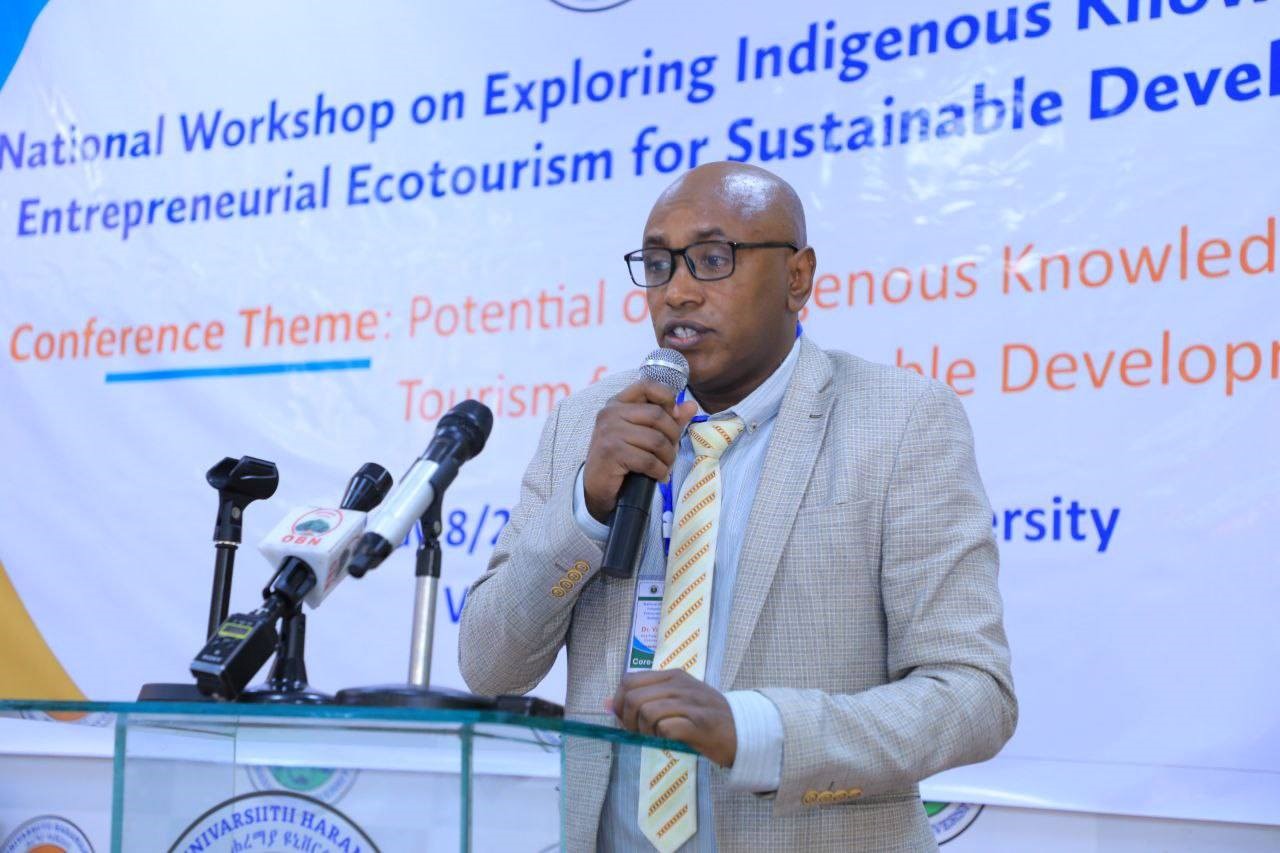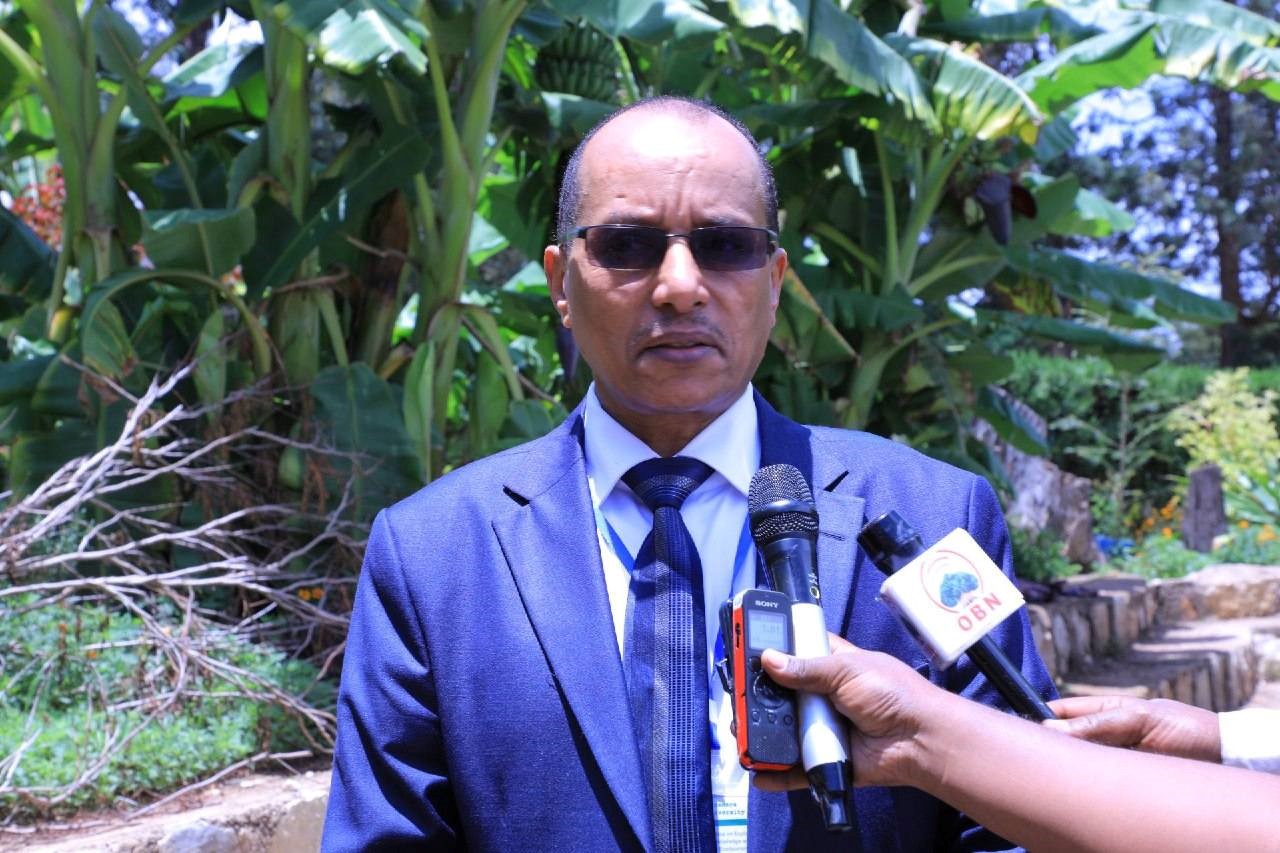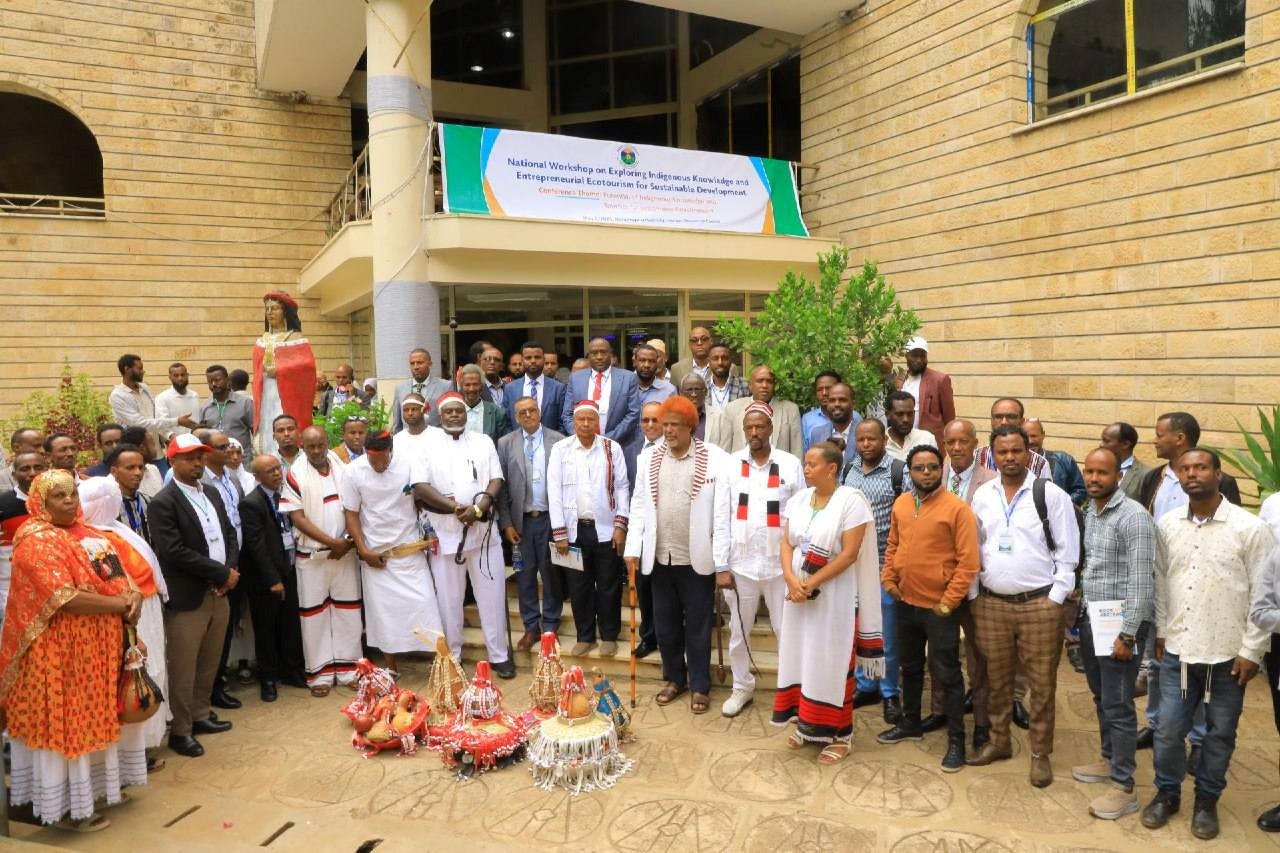Haramaya University Leads National Effort to Unlock Indigenous Knowledge and Ecotourism Potential
HARAMAYA, Ethiopia (May 10, 2025) – Haramaya University hosted a national workshop on April 8, positioning itself at the forefront of Ethiopia’s drive to leverage indigenous knowledge and entrepreneurial ecotourism for sustainable development.

Haramaya University took a leading role in advancing Ethiopia’s sustainable development goals by hosting the first National Workshop on “Exploring Indigenous Knowledge and Entrepreneurial Ecotourism for Sustainable Development.” The workshop, organized by the University’s Entrepreneurship and Technology Incubation Directorate and the Indigenous Knowledge office, was held at the main campus resource center.
The conference convened key stakeholders, including Dr. Yishak Yousuf, Haramaya University’s Vice President for Research and Community Engagement; Mr. Woldu Yemessel, Director General for Ethiopian Intellectual Authority; Mr. Natnael Solomon, the Ministry of Health Traditional Medicine Desk Coordinator; Mr. Dawite Alemayehu, the Oromia Tourism Office Commission Commissioner delegate; and other federal and regional invited guests, university representatives, local community representatives, and members of the Haramaya University community.
At the workshop’s opening ceremony, Dr. Yishak Yousuf, Vice President for Research and Community Engagement, emphasized Ethiopia’s wealth of under-exploited indigenous knowledge. He cautioned that this knowledge is at risk of extinction due to poor documentation, stressing the need to prioritize its preservation. Haramaya University plans to launch an indigenous knowledge journal, bringing the university’s total number of journals to six. Dr. Yishak stated that exploring and documenting this knowledge can contribute to addressing national challenges such as poverty reduction, environmental protection, and the preservation of cultural heritage.
Dr. Yishak further noted that, like indigenous knowledge, the potential of tourism remains largely untapped, particularly community and entrepreneurial tourism, which deserve greater focus. He asserted that fully utilizing these opportunities will stimulate economic growth, reduce poverty, create employment, and enhance food security.
 In his keynote speech, Mr. Woldu Yemessel, Director General for the Ethiopian Intellectual Property Authority, emphasized that indigenous knowledge is community-based and independent of technology, relying on intergenerational learning. He stressed the importance of registering, documenting, and protecting this knowledge to prevent its extinction and enable its explicit use for societal and national benefit, including income generation. Drawing on international best practices in intellectual property protection, the country is actively working to advance these efforts.
In his keynote speech, Mr. Woldu Yemessel, Director General for the Ethiopian Intellectual Property Authority, emphasized that indigenous knowledge is community-based and independent of technology, relying on intergenerational learning. He stressed the importance of registering, documenting, and protecting this knowledge to prevent its extinction and enable its explicit use for societal and national benefit, including income generation. Drawing on international best practices in intellectual property protection, the country is actively working to advance these efforts.
Furthermore, the Director General highlighted the importance of establishing robust legal frameworks for intellectual property registration, documentation, and protection. He cited examples of highly successful institutions, such as Google and Microsoft, and how they leverage intellectual property rights to drive business and economic growth.
 Mr. Natnael Solomon, Coordinator of the Traditional Medicine Desk at the Ministry of Health, stated in his keynote speech that indigenous knowledge contributes significantly to the national development program. He added that federal government policy prioritizes the development of this sector. For the past several years, the Federal Ministry of Health has been working to develop and support the indigenous health medicine sector, fostering coordination with the formal medicine and treatment sector. Furthermore, the Ministry of Health has established a coordinating office for the indigenous traditional medicine sector, which actively provides necessary support to relevant organizations where needed. Mr. Natnael also noted that, for the first time at the national level, a detailed herbal pharmacopoeia containing information on 36 medicinal plants has been prepared in collaboration with Ethiopian pharmaceutical scientists, both local and from the diaspora.
Mr. Natnael Solomon, Coordinator of the Traditional Medicine Desk at the Ministry of Health, stated in his keynote speech that indigenous knowledge contributes significantly to the national development program. He added that federal government policy prioritizes the development of this sector. For the past several years, the Federal Ministry of Health has been working to develop and support the indigenous health medicine sector, fostering coordination with the formal medicine and treatment sector. Furthermore, the Ministry of Health has established a coordinating office for the indigenous traditional medicine sector, which actively provides necessary support to relevant organizations where needed. Mr. Natnael also noted that, for the first time at the national level, a detailed herbal pharmacopoeia containing information on 36 medicinal plants has been prepared in collaboration with Ethiopian pharmaceutical scientists, both local and from the diaspora.
The workshop featured thirteen presentations of study papers related to Indigenous and Traditional Knowledge and Entrepreneurial Ecotourism, fostering engaging discussions among participants. This event underscores Haramaya University’s dedication to leading the way in exploring and promoting indigenous knowledge and ecotourism for sustainable development, solidifying its role as a key contributor to Ethiopia’s progress.

Reported by Aweke Ayalneh
Camera by Behaylu Girma
Hramaya University Public and International Relation Directorate
